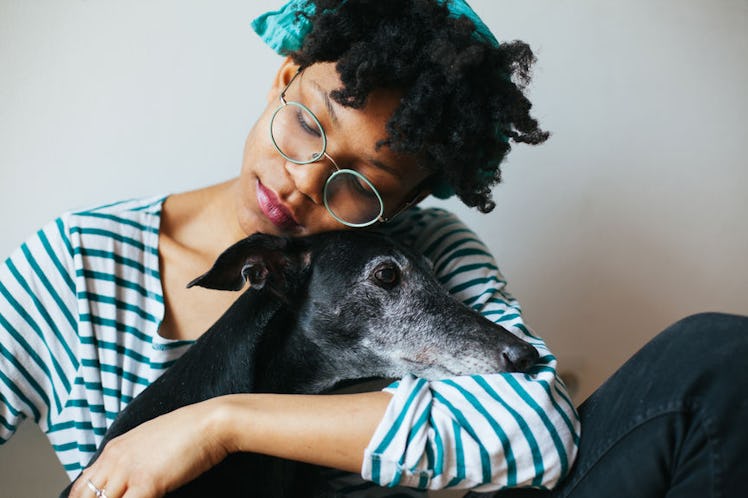
Science Says Dogs Really Do Want To Comfort You When You’re Upset & I’m Pawsitively Shook
You know those moms who have the bumper sticker on their car that says, "my kid's an honor roll student"? That's literally me with my dog. In my eyes, my furry boy is the sweetest, smartest, cutest pup on the planet. One of the beliefs I have about him (and cling to most fiercely) is that he's emotionally intelligent. He curls up on my lap when I'm upset, and jumps on me when I'm in a good mood. But I've never been able to "prove" Maddux is as emotionally intuitive as I believe he is. Can dogs sense your emotions? A new study suggests they can, and I honestly could not feel happier or more validated.
The study, published in the journal Learning & Behavior, divided 34 dogs and their owners into two groups to test what would happen when the pups believed their owners might be in danger, but not immediately within reach to help or save. The dogs and their respective owners were placed in two different rooms and were separated by an easy-to-open plexiglass door, through which the dogs could see and hear their humans. The researchers asked one group of owners to cry out for help in a distressed voice every 15 seconds, and the other group to hum, "Twinkle, Twinkle, Little Star," and say "help" in a neutral voice every 15 seconds.
While the study itself was admittedly pretty small, the results were not. CNN reports that the pups of the gently-humming owners took an average of about 96 seconds to open the door, while the pups of the owners who sounded distressed took an average of only about 23 seconds. Factors such as breed, age, and whether the dog was a service animal didn't seem to have an effect on how quickly the pups rushed to rescue their owners.
In other words, it seems that a dog will pretty much always rush to their owner's side when they feel the person is trapped or needs help. But what's especially fascinating is how the pups that believed their owners seriously needed help responded so much more quickly, if not urgently.
But why does your sweet pup feel such a strong need to rescue you from danger in the first place?
It's hard to know for sure, but it may have something to do with dogs' ability to empathize. St. Bernards have famously been portrayed as heroic rescuers in pop culture, but many other breeds have made the news for saving their owners. This study, while small, may show why exactly these things happen so often. Emily Sanford, a graduate student in psychological and brain sciences at Johns Hopkins University and a co-author of the study, told CNN,
It is interesting to think that all these anecdotes of dogs rescuing humans, they could be grounded in truth, and this study is a step toward understanding how those kinds of mechanisms work.
It's (sadly) impossible to know exactly what's running through your furry pal's head, so the researchers can't really explain what, specifically, made the urgent puppies in the study save their owners so quickly. However, the study authors suspect it comes down to an almost human-like empathy. The research stated,
This behavior sometimes appears to be motivated by desire for social contact alone but follows human patterns of empathetic helping in conditions of distress.
What's more, Angie Johnston, a lecturer in psychology at Yale University, told CNN, is that this research may suggest dogs are more similar to humans than any of us realize: "The thing that's especially interesting is that [this] lines up with previous research with humans, showing that humans are also more likely to help if they're not as stressed out by the situation," she told the news outlet. Fascinating stuff, right?
And BTW, even more research shows that your dog definitely loves you, and not just your treats.
Gregory Berns, a neuroscientist at Emory University and author of the book What It’s Like to Be a Dog, told National Geographic back in 2017 that dogs do, in fact, have feelings, including meaningful love for their owners. In an experiment he performed, Berns tested the idea that our pups only love us because we give them food. After giving the dogs two options — one that rewarded them with a treat, and one that rewarded them with praise from their owner — Berns found that while some dogs exclusively prefer treats or praise, the majority fell somewhere in the middle, wanting both a tasty snack and their owner's love.
This adorable finding is, apparently, also echoed by dogs' brain structures. Dr. Stanley Coren, professor emeritus in the Department of Psychology at the University of British Columbia and author of a number of dog books, explained the chemical similarities between dogs and people in a 2013 article for Psychology Today:
Dogs also have the same hormones and undergo the same chemical changes that humans do during emotional states. Dogs even have the hormone oxytocin, which, in humans, is involved with feeling love and affection for others.
OK, I'm definitely going to take that to mean that my own cuddly doggie is as obsessed with me as I am with him. Thanks, Stan!